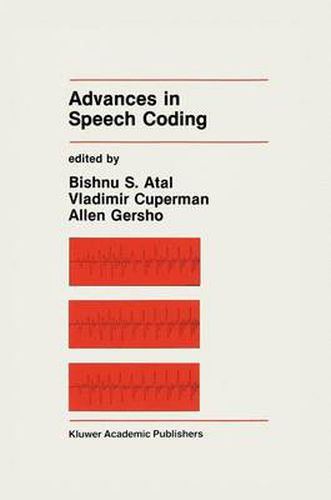Readings Newsletter
Become a Readings Member to make your shopping experience even easier.
Sign in or sign up for free!
You’re not far away from qualifying for FREE standard shipping within Australia
You’ve qualified for FREE standard shipping within Australia
The cart is loading…






This title is printed to order. This book may have been self-published. If so, we cannot guarantee the quality of the content. In the main most books will have gone through the editing process however some may not. We therefore suggest that you be aware of this before ordering this book. If in doubt check either the author or publisher’s details as we are unable to accept any returns unless they are faulty. Please contact us if you have any questions.
Speech coding has been an ongoing area of research for several decades, yet the level of activity and interest in this area has expanded dramatically in the last several years. Important advances in algorithmic techniques for speech coding have recently emerged and excellent progress has been achieved in producing high quality speech at bit rates as low as 4.8 kb/s. Although the complexity of the newer more sophisticated algorithms greatly exceeds that of older methods (such as ADPCM), today’s powerful programmable signal processor chips allow rapid technology transfer from research to product development and permit many new cost-effective applications of speech coding. In particular, low bit rate voice technology is converging with the needs of the rapidly evolving digital telecom munication networks. The IEEE Workshop on Speech Coding for Telecommunications was held in Vancouver, British Columbia, Canada, from September 5 to 8, 1989. The objective of the workshop was to provide a forum for discussion of recent developments and future directions in speech coding. The workshop attracted over 130 researchers from several countries and its technical program included 51 papers.
$9.00 standard shipping within Australia
FREE standard shipping within Australia for orders over $100.00
Express & International shipping calculated at checkout
This title is printed to order. This book may have been self-published. If so, we cannot guarantee the quality of the content. In the main most books will have gone through the editing process however some may not. We therefore suggest that you be aware of this before ordering this book. If in doubt check either the author or publisher’s details as we are unable to accept any returns unless they are faulty. Please contact us if you have any questions.
Speech coding has been an ongoing area of research for several decades, yet the level of activity and interest in this area has expanded dramatically in the last several years. Important advances in algorithmic techniques for speech coding have recently emerged and excellent progress has been achieved in producing high quality speech at bit rates as low as 4.8 kb/s. Although the complexity of the newer more sophisticated algorithms greatly exceeds that of older methods (such as ADPCM), today’s powerful programmable signal processor chips allow rapid technology transfer from research to product development and permit many new cost-effective applications of speech coding. In particular, low bit rate voice technology is converging with the needs of the rapidly evolving digital telecom munication networks. The IEEE Workshop on Speech Coding for Telecommunications was held in Vancouver, British Columbia, Canada, from September 5 to 8, 1989. The objective of the workshop was to provide a forum for discussion of recent developments and future directions in speech coding. The workshop attracted over 130 researchers from several countries and its technical program included 51 papers.